- Home
- Bruce Sterling
The Artificial Kid Page 6
The Artificial Kid Read online
Page 6
A stranger walked gracefully out of the darkness. He was short, about my height, but broader in build, with a handsome, well-trimmed auburn beard. He was wearing an historical costume, a soberly cut black formal suit with white pinstripes, woven out of threads, in the antique style. He had no Harlequinade mask.
Whitcomb sat on a chunk of rubble at the edge of the small cleared area. “Good evening, sir,” he said politely. “I seem to have, ah, lost my way. This rubbled area here—” he waved one arm eloquently—“isn’t this where the Chairman’s Building once stood?”
“Yes, that’s right,” I said. For some reason, I took an instant liking to the old bearded man. I spoke to him kindly. “Listen, sir, you seem to be rather confused. Perhaps you’re under the influence of some drug. That’s all very well when the City’s at play and the Zone is in truce. But the Harlequinade is over now. You shouldn’t be in the Decriminalized Zone unarmed.”
“Sir, I thank you for that warning,” he said. For a long moment, he looked me over. Whitcomb’s round, amber-colored eyes seemed to miss nothing. He said, “I feel that I should recognize you. Your face and that very tasteful hair seem familiar to me. You must pardon me for my apparent negligence. My memory has been affected—I suspect a breakdown in my computerized memory system. Perhaps I’ve seen you on tape before?”
“Very likely,” I said. “Strangely, you look rather familiar to me, too, Mr. Whitcomb.” I looked at him critically. “Maybe it’s your costume. It looks like the sort of thing the old, pioneer Board of Directors used to wear.” I stepped up close to him and touched the peculiar material of his sleeve. “A bit stern perhaps … stodgy … on you it looks good, however.” I stepped back. “I tell you what, Mr. Whitcomb. You seem to be a man of substance, well worth bothering with. I’m sure you want to avoid the embarrassment of having your condition revealed publicly.”
Whitcomb nodded quickly. “Yes. With all respect to Madame Twiceborn’s suggestions, I’d like to avoid police involvement or any, ah, formal proceedings.”
I nodded sympathetically. The old man’s status was at stake. “These things can happen to anyone your age,” I said airily. “What you need is competent, discreet treatment. My good friend Mr. Money Manies—you’ve heard of him of course—can help you recover your memory and restore you to yourself. There will be no charge. Mr. Manies is generosity itself.”
“That’s very kind of you, sir.”
“People call me the Artificial Kid.”
“Well, I’m very glad to make your acquaintance,” he said. “My name is Amphine Whitcomb.” He extended his hand. It took me a while to catch on, but I shook it. It’s a custom you don’t see much nowadays. He must have been very old.
“I’d like to take you home now, but other matters press,” I said. “I could give you directions there, but my computer guards my house against intruders. Saint Anne, could I trust you with the password to the house? It’s a bit complex—you never know when a spy camera might be watching or listening.…” I broke off as I saw Brains returning from the ruins, adroitly dodging through the rubble. “They’re coming,” he gasped, then drew up short. “Who are these people?”
“Friends,” I said. “But not combatants. Call them clients for the time being. Yes, I declare them my clients.”
“Well … Kid …” said Brains hesitantly, “I hate to imply that your ability to shelter clients is in question, but for the time being I’d suggest that they withdraw.”
“Let them watch,” I said. “I’m ready if you are. Did you see Quade?”
“She should be released soon. That’s my understanding,” said Brains. One by one, he began shutting off his cameras. The Clone Brothers had arrived.
“A lovely night to you, poisoned and foredoomed Kid,” said one of the Clones, mincing up out of the shadows. A long chain dangled from his hand, clinking delicately on the ground. “A night you will long remember … a night that will make you wince henceforth at the mention of our name.”
“He was supposed to be alone,” another of the Clones told Brains accusingly.
Brains shrugged. “These are noncombatants. None of my doing. Our agreement still holds?”
“You will receive the rest of your recompense, helpful Brains. Our patron’s resources are vast.”
“Yes, so I’ve learned.” Brains picked up his four dead cameras with a mournful look. He had already stepped carefully out of range of a surprise attack. “I can’t bear to record this,” he said. “Kid, I offer my regrets, but the reward was just too great. My new lover’s tastes are expensive. Call me when you get out of intensive care, and put the medical expenses on my tab. Believe me, I can afford it.” He left.
“That’s great, Brains,” I shouted at his retreating back. “I hope to return the favor some time.” I turned to Saint Anne and Whitcomb. “As you can see, I’ve been betrayed. I suggest that you run as fast and as far as you can.” They exchanged glances, then began to back up rapidly, stumbling over rubble. Then they turned and fled into the darkness.
The Clones unlimbered their chains and drew nearer. They were all wearing infrared glasses, which gave them another advantage over me; otherwise I would have considered running and trying to out-dodge them in the rubble.
A peculiar hesitation gripped all four Clones. “Our tactics regarding your spindly client might seem provocative of blood feud, oh ignoble and much-outnumbered Kid,” said the fourth Clone.
“And, indeed, we would enjoy your murder,” said the first one, bravely.
“However, the loss of our best-known opponent would hurt our audience even if it helped our reputations. Therefore, you will be spared.” This came from the Clone who was limping, badly.
“Your client is in the hands of Red, our puissant patron. She will be released when we deliver to him the tapes of your destruction. This occasion is imminent. Therefore, prepare to reap the whirlwind of our multiple wrath!”
I didn’t wait. With a cry, I attacked the nearest Clone. I kicked him in the midriff with my steel-toed slipper, knocking him down in a tangle, and numbed another’s arm with my chuck, but there were too many of them. A heavy iron chain hit my kneecap with crippling impact and I went down, squalling, kicking and gouging.
It was lucky for me that Old Dad had bequeathed me a tough, surgically altered body. My skull was sheathed with thin plates of ceramic reinforcement, and my teeth, all false, were white ceramic over a crystalline metal core. The leather body armor under my costume protected heart and kidneys, and my ribcage was reinforced. I needed it, because they gave me a terrible beating. My plastic hair helped a little with the blows to my head, but I felt the kiss of chains on legs and arms and chest and back and buttocks and padded groin. They turned me into a human drum that they beat in 4/4 time, chattering excitedly amongst themselves in the peculiar abbreviated vocabulary that they used with one another: “Pretty!” “Happy!” “Beat!” “Kick!”
As I lay there, battered and semiconscious, they slipped smuff into my mouth. True, they did it surreptitiously, but even the loathsome Clones were not devoid of this last shred of combat etiquette. Then they climbed with spiderlike agility up the great limestone pedestal of Moses Moses’ statue. Hoisting me up by the arms and legs, they scuttled to the edge of the statue’s base. “Kiddy off the statue, Kiddy off the statue!” they chanted happily, seizing me by the wrists and ankles. They swung me back and forth, gathering momentum: “One!” “Two!” “Threeee!” and they pitched me headfirst into space. I fell ten feet to land with a wet crunch on my back and shoulders. Magnanimously, they tossed down my nunchuck. I blacked out.
4
When I returned to consciousness my body was aflame with pain. With swollen fingers, I dug into the sealed pocket of my combat jacket and pulled out my smuff. Before I opened my eyes I swallowed it. The pain went far away and I sat up slowly.
I was not in my home, which surprised me. Usually, Quade came and got me if I had been severely beaten up. But of course, Quade had been taken. I saw
that I was in an abandoned building with Saint Anne Twiceborn.
“Don’t move!” Saint Anne cautioned. “Lie back down! You’ve been horribly beaten, Mr. Kid.”
I snorted. “That should be obvious.” I pulled off the thin, bloodied rags of my Harlequinade costume and looked myself over. It was ugly. “Feels like I broke my collarbone.” I dug into the numbed flesh with my fingertips. “No, it’s all right. What are you doing here, anyway? What am I doing here? I’m supposed to be at home being tenderly nursed in delicious luxury. Why am I still out here in the ruins?” I looked at her suspiciously. “Did you drag me in here?”
“We found you unconscious and bleeding,” she said indignantly. “What were we supposed to do?”
“How long have I been out?” I walked to the leaning, corroded door and looked outside. I checked the position of the stars. “Just past midnight. Where’s my housekeeper? She should be released by now, unless the Clones have compounded their treachery.” I checked the inner pockets of my combat jacket. “My locator is still on. She should have been able to find me by now if she’s returned to my house.” I turned my locator off and looked to see if I still had all six of my cameras. I still did. I turned to Saint Anne. “Have you seen my servant? Quade Altman?”
“I’m afraid not,” Saint Anne said. “I’ve been hiding you in here for hours now. Please stop walking around so, Mr. Kid. You’re a horribly sick man. Your pores are full of little black worms! They kept creeping into your wounds! If I hadn’t found these tweezers in your pocket I could never have picked them out!”
“Little black worms?” I said, puzzled. Suddenly I realized what she had done. “Those were my follicle mites! You stupid fanatic! Those things live in wounds! They eat dead cells, they eat bacteria! Now it’ll take forever to heal!” I clutched my head. “That was the worst thing you could have possibly done! I ought to pound you black and blue!” I snatched up my candy-striped nunchuck, but stopped when I saw her reaction of injured innocence. I looped the ’chuck into its usual position around my neck. I stared at her. “You’re a very strange woman, Saint Anne. And you don’t understand all this—this world of mine. Are you aware of the harm you’ve done?”
“I meant to help, Mr. Kid. We could have run away, but we stopped when we saw you suffering. I’m sorry, but how was I to know?”
“Did I ask for your interference?” I said rhetorically, but without much heat. She had deflated me again. “And stop calling me Mr. Kid, dammit. Call me Kid or Arti.” I reached into my sealed jacket pocket for my drugpak and treated myself to a stimulant. The rush hit me harder than I had expected. I put my head between my knees and breathed shallowly until my head cleared. “There. That’s better. Now let’s have a look at me.” I dug into a wound on my forearm and pulled back a flap of doubled-under skin. “At least you had the good sense to smear quikclot on some of these things.”
“I saw you use it on Mr. Spinney a week ago.”
“Pardon me while I strip.” I pulled off my combat clothes and treated the wounds she hadn’t touched. She averted her eyes. I laughed scornfully. “Some nurse you are! My death, with you around I’m lucky to be alive!”
I gestured her to her feet. “Here, make yourself useful for once. Help me smear on some of this skin oil.” I brought out my spare packet of oil. “Come on, my skin won’t burn your hands. This oil will feed the survivors among those poor mites you killed. You just smear it on my back. I’ll do the threatening parts.” I laughed, a little hysterically. The stimulant was getting to me.
“You need hardly regard me as a sexual threat, Saint doll. You could see that for yourself, without me telling you. I share your contempt for that silly, gross coupling.” I smeared the oil all over myself. Luckily the mites multiplied rapidly in the right conditions and would soon be able to resume their healthful work. I put mite-permeable skinseal over the remaining open wounds. There was dried blood all over me, even inside my nostrils; I had lost a lot of it. My plastic hair was all clotted together; scalp wounds always bleed a lot. I felt dizzy, but it was probably just the smuff, and the stimulant would take care of that. I put my clothes back on.
“Let’s go home,” I said. “Where’s your pinstriped friend?”
“Out in the Plaza,” Anne said. “He’s been wandering back and forth through the ruins for hours now. It seems to fascinate him. I warned him that it was dangerous, but he paid no heed.”
“He’s a strange one,” I said. “I don’t buy this amnesia story of his, either. It’s no computer breakdown. He’s too dazed for that. It’s either drugs or suicide trauma.”
Anne nodded slowly. “Something terrible has happened to him. He still needs my help.”
“How did you run into him, anyway?”
“I met him for the first time early this morning. I was watching the Telset Ballet perform. I’ve always enjoyed watching dances. It’s very wicked of me, of course, but if Telset’s to be my home I’ll have to accustom myself to seeing such things.”
“How broad-minded of you.”
“I wasn’t wearing a mask, and had some difficulties because of it. I was standing quietly at the edge of the crowd. A man—Mr. Whitcomb—appeared at my elbow. I noticed that he wasn’t wearing a mask either, so I smiled at him, and he said, ‘I wonder if you can tell me, young lady—are most of the people in this crowd human?’ Those were his exact words. I thought he was making a joke, but he was quite serious. He pointed out an eight-legged man nearby and swore the man was an alien. He said the man had tried to pull his face off.”
“But mechanized legs show up at every Harlequinade,” I objected. “In fact, they’re kind of passé right now. And the man probably thought that Whitcomb was wearing some kind of incredibly detailed beard mask.”
“We exchanged names, and then he asked me if I had anything to drink. He said he was afraid to ask the masqueraders for food or water. I gave him some juice. He seemed terribly thirsty. Then he began to ask me all kinds of strange questions—was I a corporate shareholder, was the Board of Directors still settled in Telset at the moment. He seemed bewildered. But he was very polite. Even charming.”
“He’s in a bad way,” I said. “We’d better get him to my place in a hurry before he recovers. Money Manies loves little mysteries like this. Nothing pleases him more.”
We crept out quietly into Rubble Plaza. Anne’s hideaway bordered on it. We soon found Whitcomb sitting quietly under a tilted slab of shattered wall, staring at the titanic statue.
“Well, young citizen,” Whitcomb said when he saw me. “Up again, I see. You certainly are of resilient fiber. I wonder if you could tell me—this is, of course, the famous statue of—?”
“Moses Moses,” I said.
“Yes, I thought so,” he said. He smiled and got to his feet. “I am at your service.”
The buildings in the Decriminalized Zone, my own home included, are the oldest on Reverie. Most of them were abandoned painlessly; their peculiar starkness makes them repugnant to modern Reverid tastes. Modern Reverids prefer open, lavish, baroque homes, handcrafted out of native materials—Many Mansions, for instance. The buildings of the Zone were all constructed from orbit by drones, using the same techniques that had proven successful during the century-long Mining of the Morning Star.
First the island of Telset was fried with orbital lasers until sterile. Then orbital pods landed, laden with drones and raw materials. They were directed by the same tough-minded mining technicians who had enriched the Reverid Corporation with their manipulative skills. Their objective was to build a city capable of housing fifty thousand Reverids, about the population of one oneill.
The result was so uninspiring that most Reverids, who had already lived through one century in orbit and had made their big cylindrical oneills amazingly lavish and comfortable, simply decided to stay there. They could see all they wanted of the surface through their drones, which were often provided with a direct cerebral hookup and had reached a peak of development during the long and horri
bly complicated mining years.
We Reverids have no equals in our mastery of drones—“drone” meaning any one of several types of self-propelled mechanisms, piloted from a distance. We learned our mastery the hard way, mining the hostile, airless Morning Star by remote control. And when we settled Reverie, we put our knowledge to a thousand good uses—such as the floating cameras that make my lifestyle possible, and the computer-run armies of robots whose orbiting farms and factories make us continually richer.
The pioneer surface Reverids were much concerned with biocontamination; understandably, too, because Reverid protozoans are amazingly advanced. Most typical bacteria elsewhere, for instance, come in three shapes: spheres, rods, and spirals. There are plenty of those on Reverie, but there are also rings, spiral rings, T-shapes, snowflakes, and crosses. I know. I’ve seen them through Professor Crossbow’s microscopes.
The old buildings of the Zone were built by those expecting plague. They have thick doors, carefully insulated ventilating systems, and a lack of frills and furbelows where dust and trash can build up. The walls are thick masonry, lavishly reinforced with metal (which the pioneers had in plenty, thanks to their mining operations). Joints and walls are sealed incredibly tight with metallic epoxy; in the destruction of a building the epoxy is always the last to go.
All this proved grossly unnecessary when computer simulation revealed that eighty-two different species of Reverid bacteria, carefully introduced into the body, would provide all the necessary vitamin-producing and digestive functions, while killing other bacterial intruders. Getting the bacterial ecosystem set up is a long and arduous process, but after that it works fine, provided that you don’t foul it up with the wrong drugs. Freed of their fear of disease, Reverids gradually abandoned the old drone-built structures. When the Fox Day blast destroyed the Chairman’s Building and damaged many others, it was the end. Old Telset echoed, empty, while open, breezy, hedonistic structures bloomed up all around like limestone flowers.

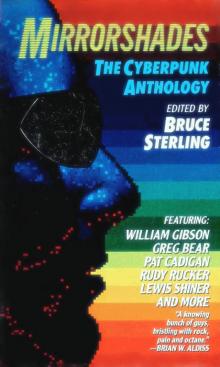 Mirrorshades: The Cyberpunk Anthology
Mirrorshades: The Cyberpunk Anthology The Wonderful Power of Storytelling
The Wonderful Power of Storytelling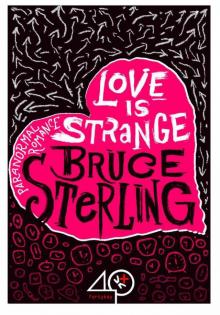 Love Is Strange (A Paranormal Romance)
Love Is Strange (A Paranormal Romance)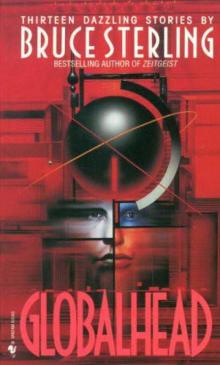 Globalhead
Globalhead Essays. FSF Columns
Essays. FSF Columns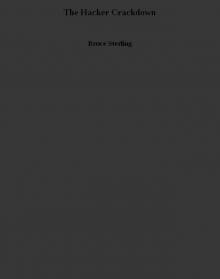 The Hacker Crackdown
The Hacker Crackdown Bicycle Repairman
Bicycle Repairman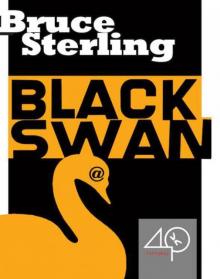 Black Swan
Black Swan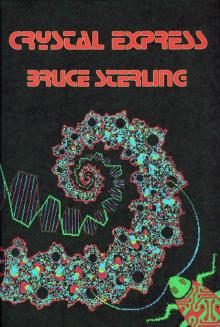 Crystal Express
Crystal Express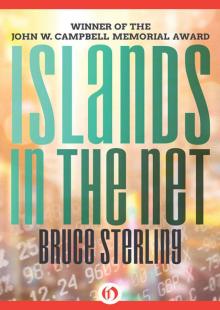 Islands in the Net
Islands in the Net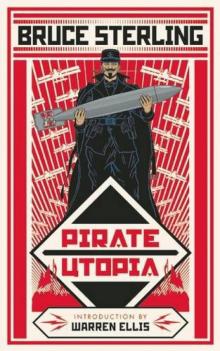 Pirate Utopia
Pirate Utopia GURPS' LABOUR LOST
GURPS' LABOUR LOST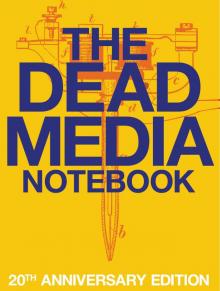 The Dead Media Notebook
The Dead Media Notebook Unstable Networks
Unstable Networks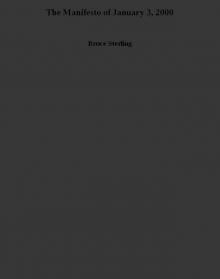 The Manifesto of January 3, 2000
The Manifesto of January 3, 2000 Heavy Weather
Heavy Weather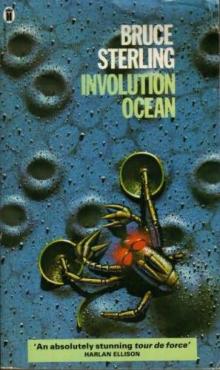 Involution Ocean
Involution Ocean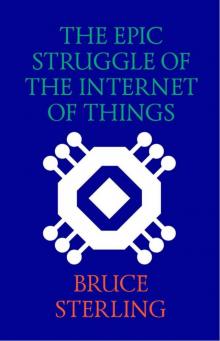 The Epic Struggle of the Internet of Things
The Epic Struggle of the Internet of Things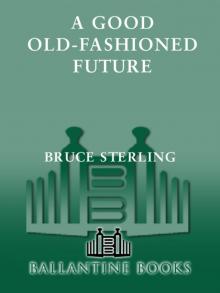 A Good Old-Fashioned Future
A Good Old-Fashioned Future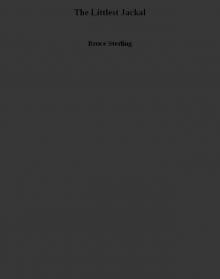 The Littlest Jackal
The Littlest Jackal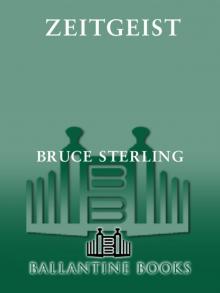 Zeitgeist
Zeitgeist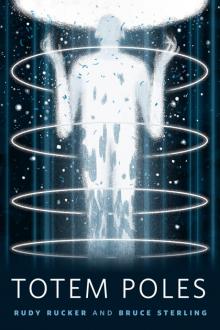 Totem Poles
Totem Poles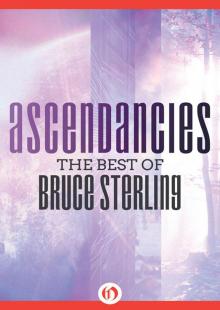 Ascendancies
Ascendancies CyberView 1991
CyberView 1991 War Is Virtual Hell
War Is Virtual Hell Taklamakan
Taklamakan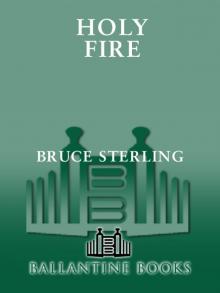 Holy Fire
Holy Fire Cyberpunk in the Nineties
Cyberpunk in the Nineties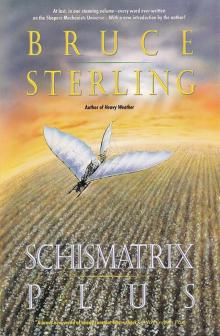 Schismatrix Plus
Schismatrix Plus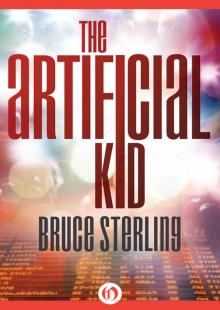 The Artificial Kid
The Artificial Kid Essays. Catscan Columns
Essays. Catscan Columns Maneki Neko
Maneki Neko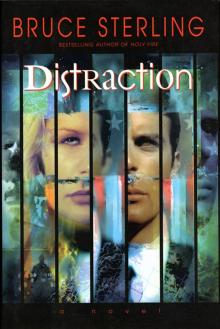 Distraction
Distraction In Paradise
In Paradise Red Star, Winter Orbit
Red Star, Winter Orbit Luciferase
Luciferase